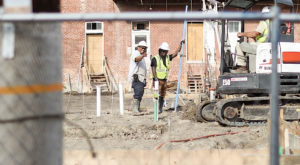
The coronavirus pandemic is taking a grip on the construction industry. It’s making it more difficult to get supplies, to complete projects, and most importantly, it’s getting harder for companies to get paid. Sending preliminary notices to the owner, GC, and even the lender can go a long way when it comes to getting paid during COVID-19. By sending these notices on all your jobs now, not only are you presenting yourself in a positive and respectful manner to all the parties involved. Preliminary notice may also help you secure your right to file a mechanics lien or bond claim should payment delays continue.
What is a preliminary notice?
A preliminary notice is a construction document that lets the important parties involved know who you are, what work you’re doing, and your payment expectations. They often provide legal protection. But it’s important to think of a preliminary notice as a communication tool that makes your construction business more visible – and more likely to get paid.
For the best chance of success, you should send these notices at the beginning of every project – not just the problem ones. This allows the appropriate parties enough time to understand all the information provided. It’s important to realize that on large jobs, there could be a large chain of contractors and subcontractors. Sometimes, the General Contractor or owner might not even be aware that you’re on the job. Your preliminary notice advises them of your presence on the job, helping to make sure you get paid.

Download the Coronavirus Survival Kit for Construction Businesses
Contractors and suppliers can take simple, concrete steps now that will help protect their business, employees, and financial health during the coronavirus - and set up their business for success once the dust settles.
Download the Survival KitWhy preliminary notices are critical during COVID-19
The coronavirus pandemic has thrown a wrench into construction projects, delaying timelines, canceling projects, and causing everyone to protect their cash. There’s simply less money to go around in construction. Lenders are less likely to issue big loans, and GCs are trying to hold onto every dollar they can. Add in the fact that suppliers want to get paid faster for their materials, and you may find yourself between a rock and a hard place. You’ve got supplier bills piling up on your desk, but are waiting longer and longer for the payment to come through.
As job sites slow down and payment becomes a problem, sending those preliminary notices to the jobs that you’re on now is incredibly important. A preliminary notice can make the difference between surviving there until the economy recovers from coronavirus, or needing to throw in the towel.
Dig deeper: Guide to Fling A Mechanics Lien When COVID Impacts Your Job
Preliminary notices improve communication
Simply put, if a GC or owner doesn’t even know you exist on a project, you’re going to have trouble getting paid. A preliminary notice informs them that you’re on the job – and are expecting payment for your work. It may also be your company’s first chance to communicate with the General Contractor, giving you an opportunity to create a pleasant, professional first impression.
Preliminary notices can be incredibly helpful to a General Contractor’s workflow. When a GC receives a preliminary notice from a sub that otherwise he wouldn’t have known about, it puts pieces of the larger puzzle together. Preliminary notice helps him to understand who’s doing what and where. Organization on a large job is incredibly important, and your notice may make a big difference in the chain of communication and information for the job moving forward.
As we’re seeing with COVID-19, clear communication will be key when it comes to getting paid. On a large job, there can be a ton of subcontractors banging on trailer doors looking to get paid. Everyone’s feeling the coronavirus-crunch, and they’ll want to collect on the money they’re owed to bolster their cash flow. A preliminary notice may help you be one of the first to get paid. That notice may be enough for you to avoid standing in line and hoping for a face to face with the GC to explain your role and the money you’re owed.

Send a Preliminary Notice
We’re the Preliminary Notice experts. With us it’s fast, easy, and done right.
Send NowPreliminary notice protects your payments during coronavirus
If coronavirus causes enough cash flow issues for the jobs you’re working on, you may need to look into other methods of ensuring payment. One of the most effective ways to get paid the money that you’re owed is to file a mechanics lien.
There are a lot of different rules and laws to filing mechanics liens, and they vary by state. Many states require subcontractors and suppliers to send preliminary notice within a specific timeframe in order to exercise your right to a mechanics lien. If you’re in a state that requires a preliminary notice and you haven’t sent one, your options become limited. The amount you can claim on a mechanics lien can be reduced, or erased entirely.
Coronavirus is crippling all industries, not just construction. Coronavirus-related payment disputes are likely to inundate the court system as this crisis continues, which could reduce your leverage. If you’re unable to file a mechanics lien because you missed the window to send a preliminary notice, your next chance at getting paid may be litigating a breach of contract or other claim.
Not only will the courts be even further inundated with cases of coronavirus-related suits, but it may be incredibly difficult to even retain a lawyer due to work-from-home and quarantine policies.
Avoid putting yourself in that difficult position by protecting your lien rights with a preliminary notice. When GCs look at their coronavirus-crippled cash flow to determine who they feel needs to be paid to avoid headaches, your invoice will carry more weight. Sending preliminary notice shows you’re savvy about payment law, and that you’re serious about protecting your business.
If your GC doesn’t have enough cash to pay all of the invoices on their desk, they’re going to pay the ones that come with the threat of a mechanics lien. Those are the invoices that could carry the most serious consequences if they aren’t paid.
Preliminary notices can help you survive coronavirus
The importance of sending preliminary notices cannot be stressed enough – especially during COVID-19. They’re the first step in opening up lines of communication and understanding on everyone’s behalf. Equally as important, they show that your company does not intend to be forgotten when cash flow becomes an issue.
Protecting your company’s interests and cash flow should be your priority as we head deeper into the coronavirus crisis. Make preliminary notices the first step in your company’s survival plan.
More coronavirus resources for construction businesses
- What’s in the $2 Trillion Coronavirus Stimulus Bill For Construction Businesses & Their Workers?
- Small Business Loans For Construction During Coronavirus | Who qualifies & how to apply
- Is Construction an Essential Business During Coronavirus Shutdown?